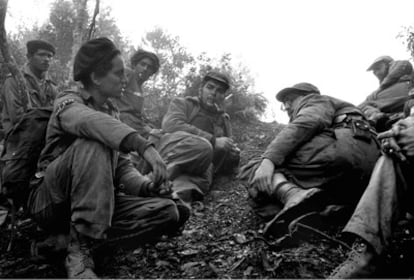Declassifying Che Guevara
Guerrilla leader's Sierra Maestra diaries published in their entirety
The Che Guevara Studies Center in Havana on Tuesday released the entire diaries kept by the late guerrilla fighter and written in small notebooks during the time he spent in Cuba's Sierra Maestra with other revolutionaries.
It is the latest project undertaken by the center that has been headed by Ernesto "Che" Guevara's widow Aleida March since its foundation in 1983.
Some of the passages in the notebooks were used later by Guevara to write his internationally famous work Pasajes de la guerra revolucionaria (Reminiscences of the Cuban Revolutionary War). The diaries cover the period from when the guerrilla took Las Coloradas beach after their clandestine arrival from Mexico on board the Granma on December 2, 1956, to the defeat of Fulgencio Batista's army and the dictator's final exile on January 1, 1959.
The book launch coincides with Guevara's birthday - he would have been 83 years old on Tuesday - and is being promoted worldwide by its publisher Ocean Press / Ocean Sur of Australia.
Prepared by the center, the collection of entries, entitled Diario de un combatiente (Diary of a soldier), doesn't contain any great surprises - many of the passages have been published piecemeal in the past. Still, there are some notebooks that researchers have never seen before because they have been considered missing for years.
A good part of Guervara's entries are notes or observations he made while in the Sierra concerning battles, skirmishes, events and incidents. Some of the descriptions were used as the basis for his Pasajes de la guerra revolucionaria tome.
But the book focuses on Guevara's first impressions on reaching Cuba. Before arriving on the Granma, Guevara only knew about the island through the eyes of Fidel Castro, his brother Raúl and the rest of the revolutionaries whom he had met while they were in Mexico planning their invasion. The Guevara entries also show how his perceptions and thinking changed while he was holed up in the Sierra.
In a statement, Ocean Press / Ocean Sur describes the diaries as "very terse notes" prepared by Guevara "for his personal use, and which he had no time to develop later." Guevara was captured and shot by the Bolivian army in 1967 while he was trying to lead an insurgency in the South American nation.
The publishers also state that readers will either "agree or disagree with some of the comments and statements" made by Che. They also contain typos and inaccuracies, the publishers point out, due in part to Guevara's initial ignorance of Cuban geography and "unknown areas where the events he refers to take place."
At the same time, Ocean Press / Ocean Sur says there are also "serious flaws" in the fighters' names as well as in dates. But after a comprehensive review, many of the errors have been corrected. Along with the still-missing pages of the diaries, Guevara's entire writings have still not seen the light of day.
The Che Guevara Studies Center says it hopes the book, along with the notes and historical documents included in the publication, will help motivate others who want to study more about the famous guerrilla.

Tu suscripción se está usando en otro dispositivo
¿Quieres añadir otro usuario a tu suscripción?
Si continúas leyendo en este dispositivo, no se podrá leer en el otro.
FlechaTu suscripción se está usando en otro dispositivo y solo puedes acceder a EL PAÍS desde un dispositivo a la vez.
Si quieres compartir tu cuenta, cambia tu suscripción a la modalidad Premium, así podrás añadir otro usuario. Cada uno accederá con su propia cuenta de email, lo que os permitirá personalizar vuestra experiencia en EL PAÍS.
¿Tienes una suscripción de empresa? Accede aquí para contratar más cuentas.
En el caso de no saber quién está usando tu cuenta, te recomendamos cambiar tu contraseña aquí.
Si decides continuar compartiendo tu cuenta, este mensaje se mostrará en tu dispositivo y en el de la otra persona que está usando tu cuenta de forma indefinida, afectando a tu experiencia de lectura. Puedes consultar aquí los términos y condiciones de la suscripción digital.








































